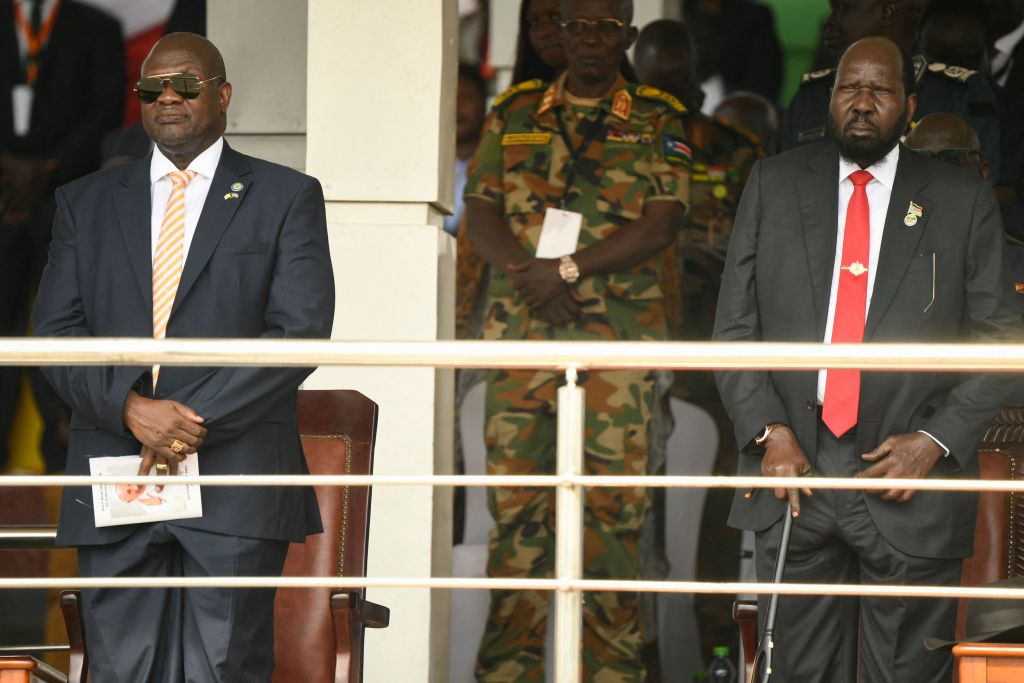Longtime mistrust between South Sudan’s top two political leaders threatens to reignite civil war in the country seven years after a peace deal ended the previous one.
At the heart of growing tensions is the relationship between President Salva Kiir and his rival, First Vice President Riek Machar. Both men control armed forces. Kiir controls the South Sudan People’s Defence Force (SSPDF), and Machar control his own militia, known as the Sudan People’s Liberation Movement-in-Opposition (SPLM-IO).
Both men also have other armed groups willing to fight alongside them in a country awash in militias and weapons.
South Sudan’s post-independence civil war between 2013 and 2018 killed 400,000 people. That conflict was, essentially, a struggle between Kiir and Machar over who would control the new country. South Sudan split from Sudan in 2011 after decades of fighting for independence from Khartoum’s rule.
A power-sharing agreement forced Kiir and Machar to work together, but tensions between the rivals never have abated.
“The trend of deficit in trust and confidence begins in mid-December 2013 until today,” Edmund Yakani, executive director of the Community Empowerment for Progress Organization (CEPO)-South Sudan, told Turkey’s Anadolu Agency. “The two leaders, since 2018, have been fully engaged in accusing each other on matters of absence of political will and commitment.”
Machar has protested the fact that South Sudan has not held a presidential election since its independence. Elections scheduled for December 2024 were postponed.
The tense relationship between Kiir and Machar hit bottom in March when Kiir placed Machar under house arrest on accusations of supporting a rebellion against the government. Several of Machar’s allies and his wife, Interior Minister Angelina Teny, also reportedly were arrested. Kiir’s press secretary, David Majur, denied that Machar and his wife were under house arrest.
The accusation grew out of an incident in early March when the government announced plans to reconfigure SSPDF forces in Nasir, a strategically important town near the border with Ethiopia. Machar loyalists known as the White Army overran the government military base in Nasir. One United Nations Mission in South Sudan peacekeeper died while evacuating government forces from the town.
The government later conducted airstrikes against the region and warned civilians to leave.
The U.N. has urged Kiir and Machar to put the country’s interests ahead of their own.
U.N. Special Representative for South Sudan Nicholas Haysom told DW that social media is helping drive increasingly hostile rhetoric. Much of that rhetoric breaks down along ethnic lines between the Dinka, South Sudan’s largest ethnic group, and the Nuer, the second largest. Kiir is Dinka. Machar is Nuer.
“What commences as a political conflict turned quite quickly into an ethnic conflict,” Haysom told DW.
Further complicating matters is the presence of the Uganda Peoples’ Defence Forces, which sent members of its Special Forces to bolster Kiir shortly after the Nasir incident. Uganda’s government agreed on March 20 to send more troops into South Sudan. Defense Minister Jacob Oboth said the action was necessary to avert what he described as “a potential security catastrophe.”
During the 2013 to 2018 civil war, Ugandan forces sided with Kiir. Machar has denounced Uganda’s current actions as a violation of a U.N. arms embargo on South Sudan.
Leaders on both sides appear to be trying to tamp down talk of war.
At the end of March, South Sudan’s National Security Service spokesman David John Kumuri reported that more than 460 members of Machar’s SPLM-IO had defected to the SSPDF or joined other government security operations.
Kumuri assured the defectors and anyone else who followed their path that their safety and security is “guaranteed without reservation.”
Machar’s supporters called for his release from house arrest and repeated their dedication to dialogue to resolve South Sudan’s political differences.
National Minister of Peacebuilding Stephen Par Kuol called for the African Union and other groups to help facilitate that dialogue.
“Peace can only be found in dialogue,” Kuol told a news briefing. “Whether inside or outside the country, we urge all South Sudanese to remain committed to peace.”


1 Comment
What is AU doing about the war in DRC?